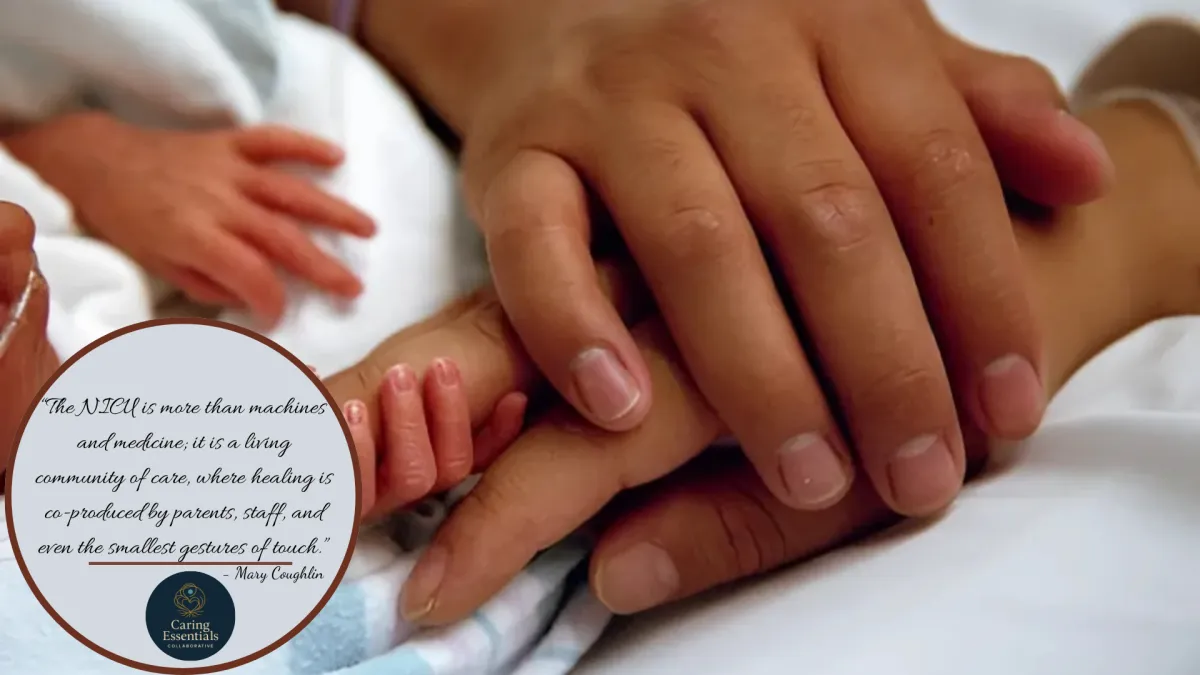
Troubling Care, Reimagining Care: Lessons from the NICU
“The NICU is more than machines and medicine; it is a living community of care, where healing is co-produced by parents, staff, and even the smallest gestures of touch.” – Mary Coughlin
Troubling Care, Reimagining Care: Lessons from the NICU
Care as Multiple and Co-Produced
Milk as Medicine, Milk as Labor
Care-Full Geographies: Place Matters
In reading Naylor, Clarke-Sather, and Weber’s (2020) Troubling Care in the Neonatal Intensive Care Unit, I felt an immediate resonance. Their work affirms what many of us have witnessed at the bedside, and what I have long argued through Trauma-Informed Developmental Care (TIDC): care is never one-dimensional. It is layered, relational, and profoundly shaped by power.
The authors invite us to step away from thinking of the NICU as simply a space of “medical care.” Instead, they open our eyes to the multiplicity of care — how kangaroo care, human milk provision, and even the gentle acts of touch and holding diapers together with wires and tubes are part of a larger community of care.
Care as Multiple and Co-Produced
What stands out in this study is the recognition that care in the NICU is co-created by parents, staff, volunteers, and yes, even machines. Care is never delivered by one actor alone. It is a choreography of skilled hands, worried hearts, monitors, incubators, privacy screens, and human presence.
This echoes the foundational truth of TIDC: healing is relational. No one heals in isolation. Infants thrive when surrounded by communities of care that recognize their humanity, their vulnerability, and their resilience.
The Power Dynamics of Care
The study also surfaces the tensions we know too well: care can be both a gift and a gatekeeping practice. Parents often need to negotiate access to kangaroo care, or permission to touch their own babies. Nurses and physicians, acting from both expertise and concern, sometimes unconsciously become gatekeepers.
One mother in the study asked: “Whose baby is it anyway?”
A question that reverberates deeply.
This is where trauma-informed principles matter. If parents feel excluded from caring for their child, the wound is not only emotional but relational. It cuts into belonging. It reinforces hierarchies that place some in power and others at the margins.
In my B.U.F.F.E.R. framework, this is where Belonging, Understanding, and Respect are essential. When care becomes a gatekeeping act, these foundational needs are at risk. And when they are absent, the very fabric of healing frays.
Milk as Medicine, Milk as Labor
The article also troubles the idea of human milk as “just” nutrition. In the NICU, milk is medicine. It prevents infection, supports growth, and saves lives. But it is also labor — often invisible, exhausting, and deeply embodied.
Pumping at three in the morning is not a “break.” It is work. It is love made tangible. And yet, it is labor that is rarely acknowledged, compensated, or even adequately supported by hospital infrastructure.
This resonates with my commitment to naming the invisible work of parents and staff alike. Whether it is a nurse repositioning an infant’s fragile body, or a mother hooked up to a pump in a windowless room, this labor is care. It deserves to be valued, honored, and supported.
Care-Full Geographies: Place Matters
Naylor and colleagues remind us that care is shaped by space. The NICU’s architecture — alcoves versus private rooms, privacy screens, or rules about food and drink — all impact how parents experience care. A mother unable to bring water into the NICU is reminded of her outsider status, even as her body labors to provide milk for her child.
This aligns with TIDC’s emphasis on the healing environment. Environment is not neutral. It either communicates safety, inclusion, and dignity — or it reinforces exclusion, control, and disempowerment.
From Troubling Care to Reimagining Care
What I appreciate most about this paper is how it affirms that care is not a single act but a weaving of science, soul, and skill. It shows us that the NICU is not only a site of medical treatment, but a living, breathing community.
And like any community, it is shaped by relationships, by who is allowed in, by who is heard, and by how power circulates.
To trouble care — as the authors suggest — is to notice these dynamics. To name the fractures. To ask harder questions.
But to reimagine care — the work that many of us are engaged in — is to move beyond noticing into creating something different:
A NICU where kangaroo care is not an exception, but a daily expectation.
A NICU where milk work is honored, supported, and resourced.
A NICU where parents are not guests but partners.
A NICU where care is not transactional, but transformational.
An Invitation
This study is a gift. It troubles what we think we know about care and reminds us of what is at stake. For me, it strengthens the call to ensure that care is:
Trauma-informed — attuned to histories and contexts of suffering.
Developmentally supportive — aligned with what infants and families need to thrive.
Equitable and relational — rooted in belonging, respect, and mutuality.
Because in the end, the NICU is more than machines and medicine.
It is a community of care.
And when we recognize that, we create the conditions not only for survival, but for healing, resilience, and hope.
Reflection Prompt:
When you think about your own caregiving — whether in a NICU, a classroom, or a community — where do you see care as multiple and co-produced? And where might power, rules, or hierarchies be acting as gatekeepers?
Until every NICU becomes a true community of care,
Mary
